Higher National Diploma in Business: Organisational Behaviour Report
VerifiedAdded on 2021/03/15
|9
|4301
|78
Report
AI Summary
This report provides an analysis of organisational behaviour, examining the influence of culture, politics, and power on individual and team behaviour within the context of the BBC. It explores the impact of different organisational cultures, including power, task, person, and role cultures, and how they have evolved within the BBC. The report delves into the application of content and process theories of motivation, such as McGregor's Theory X and Y, Maslow's hierarchy of needs, and reinforcement and expectancy theories, to achieve organisational goals. It also discusses the importance of effective teamwork and applies concepts and philosophies of organisational behaviour to a given business situation, specifically the BBC. The analysis covers the BBC's response to political and external pressures, changes in its administrative structure, and the effects of these factors on the company's overall performance and employee behaviour.
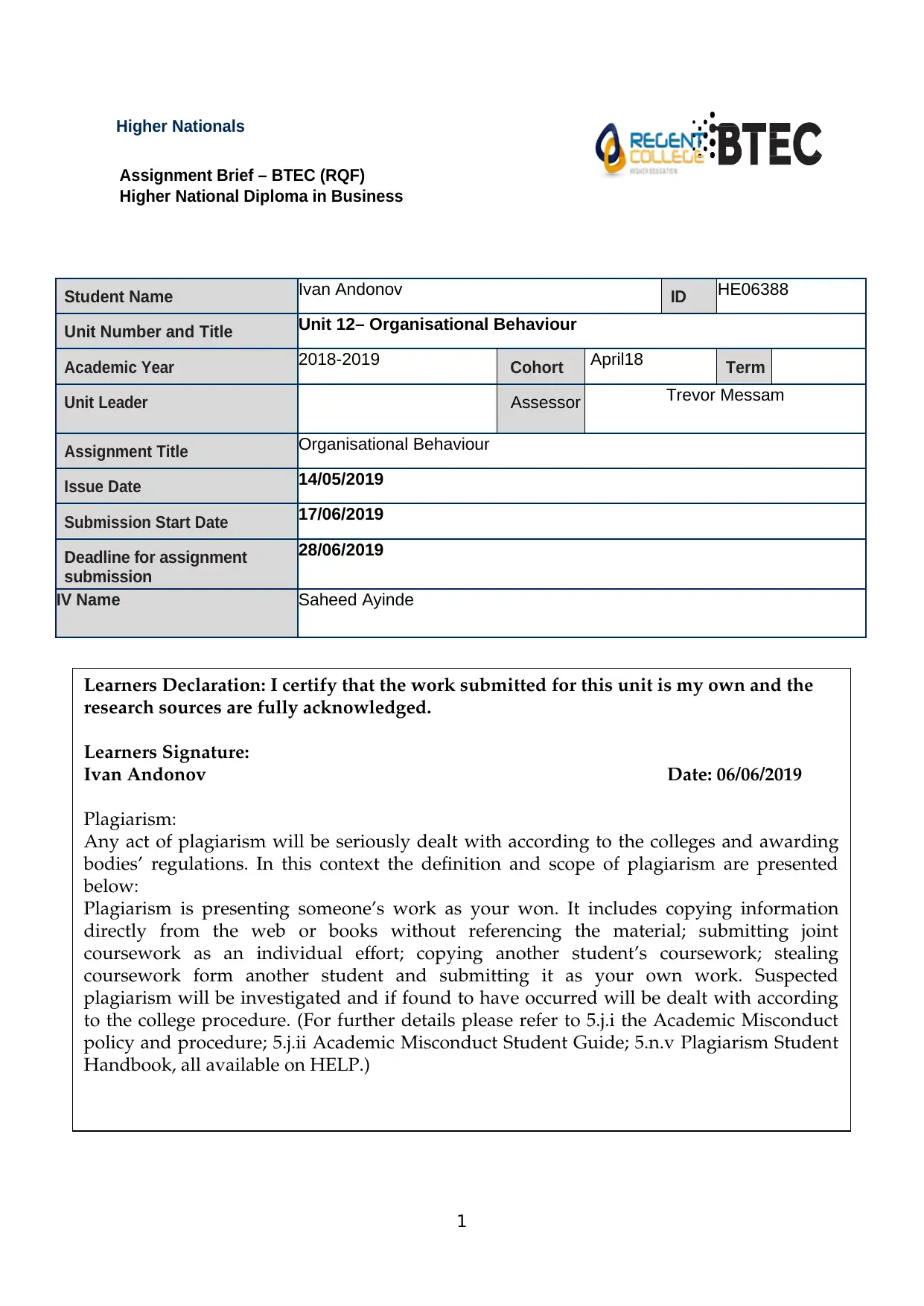
Higher Nationals
Assignment Brief – BTEC (RQF)
Higher National Diploma in Business
Student Name Ivan Andonov ID HE06388
Unit Number and Title Unit 12– Organisational Behaviour
Academic Year 2018-2019 Cohort April18 Term
Unit Leader Assessor Trevor Messam
Assignment Title Organisational Behaviour
Issue Date 14/05/2019
Submission Start Date 17/06/2019
Deadline for assignment
submission
28/06/2019
IV Name Saheed Ayinde
1
Learners Declaration: I certify that the work submitted for this unit is my own and the
research sources are fully acknowledged.
Learners Signature:
Ivan Andonov Date: 06/06/2019
Plagiarism:
Any act of plagiarism will be seriously dealt with according to the colleges and awarding
bodies’ regulations. In this context the definition and scope of plagiarism are presented
below:
Plagiarism is presenting someone’s work as your won. It includes copying information
directly from the web or books without referencing the material; submitting joint
coursework as an individual effort; copying another student’s coursework; stealing
coursework form another student and submitting it as your own work. Suspected
plagiarism will be investigated and if found to have occurred will be dealt with according
to the college procedure. (For further details please refer to 5.j.i the Academic Misconduct
policy and procedure; 5.j.ii Academic Misconduct Student Guide; 5.n.v Plagiarism Student
Handbook, all available on HELP.)
Assignment Brief – BTEC (RQF)
Higher National Diploma in Business
Student Name Ivan Andonov ID HE06388
Unit Number and Title Unit 12– Organisational Behaviour
Academic Year 2018-2019 Cohort April18 Term
Unit Leader Assessor Trevor Messam
Assignment Title Organisational Behaviour
Issue Date 14/05/2019
Submission Start Date 17/06/2019
Deadline for assignment
submission
28/06/2019
IV Name Saheed Ayinde
1
Learners Declaration: I certify that the work submitted for this unit is my own and the
research sources are fully acknowledged.
Learners Signature:
Ivan Andonov Date: 06/06/2019
Plagiarism:
Any act of plagiarism will be seriously dealt with according to the colleges and awarding
bodies’ regulations. In this context the definition and scope of plagiarism are presented
below:
Plagiarism is presenting someone’s work as your won. It includes copying information
directly from the web or books without referencing the material; submitting joint
coursework as an individual effort; copying another student’s coursework; stealing
coursework form another student and submitting it as your own work. Suspected
plagiarism will be investigated and if found to have occurred will be dealt with according
to the college procedure. (For further details please refer to 5.j.i the Academic Misconduct
policy and procedure; 5.j.ii Academic Misconduct Student Guide; 5.n.v Plagiarism Student
Handbook, all available on HELP.)
Paraphrase This Document
Need a fresh take? Get an instant paraphrase of this document with our AI Paraphraser
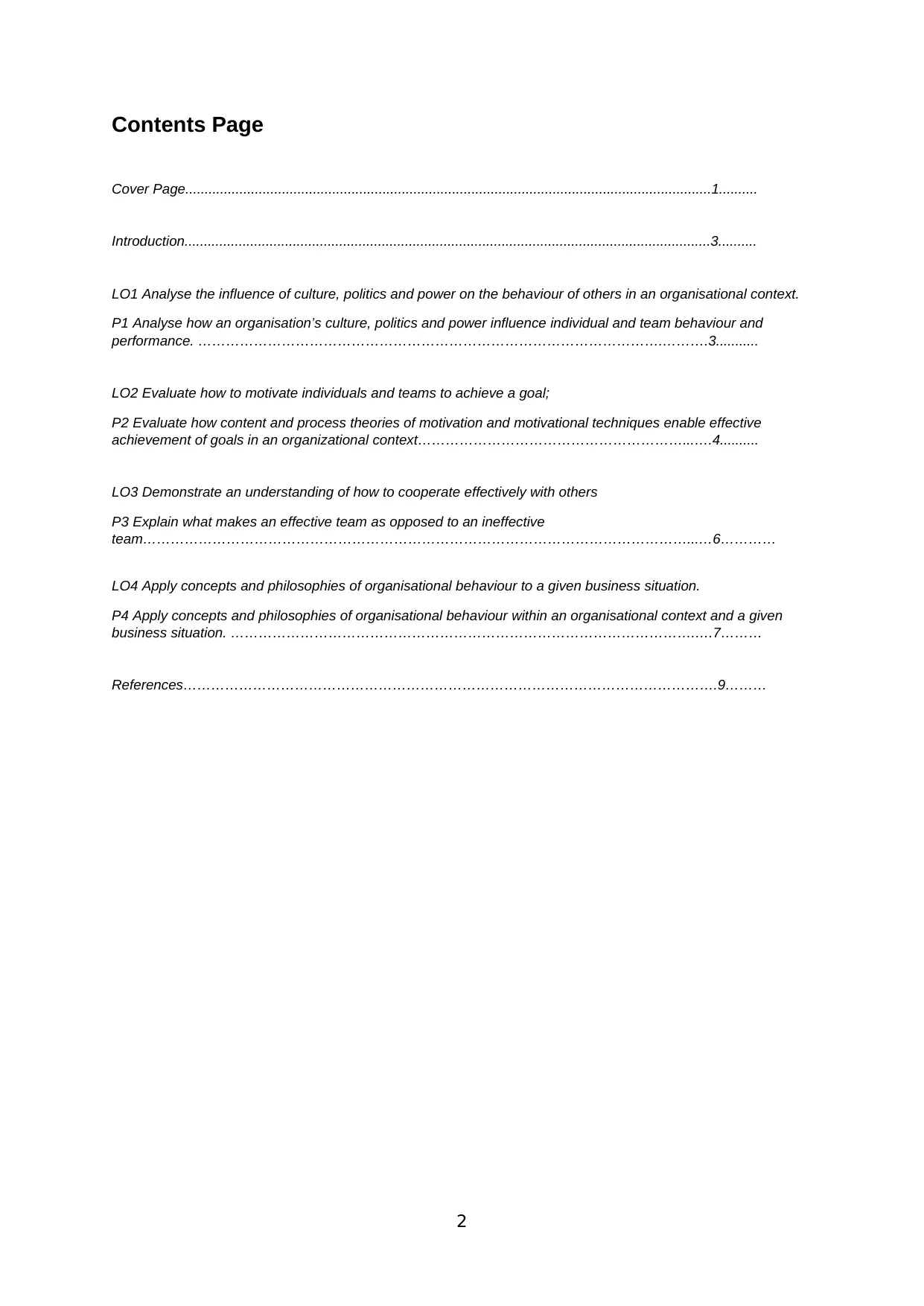
Contents Page
Cover Page........................................................................................................................................1..........
Introduction........................................................................................................................................3..........
LO1 Analyse the influence of culture, politics and power on the behaviour of others in an organisational context.
P1 Analyse how an organisation’s culture, politics and power influence individual and team behaviour and
performance. ……………………………………………………………………………………….……….3...........
LO2 Evaluate how to motivate individuals and teams to achieve a goal;
P2 Evaluate how content and process theories of motivation and motivational techniques enable effective
achievement of goals in an organizational context…………………………………………………...….4..........
LO3 Demonstrate an understanding of how to cooperate effectively with others
P3 Explain what makes an effective team as opposed to an ineffective
team………………………………………………………………………………………………………...…6…………
LO4 Apply concepts and philosophies of organisational behaviour to a given business situation.
P4 Apply concepts and philosophies of organisational behaviour within an organisational context and a given
business situation. ……………………………………………………………………………………….….7………
References…………………………………………………………………………………………………….9………
2
Cover Page........................................................................................................................................1..........
Introduction........................................................................................................................................3..........
LO1 Analyse the influence of culture, politics and power on the behaviour of others in an organisational context.
P1 Analyse how an organisation’s culture, politics and power influence individual and team behaviour and
performance. ……………………………………………………………………………………….……….3...........
LO2 Evaluate how to motivate individuals and teams to achieve a goal;
P2 Evaluate how content and process theories of motivation and motivational techniques enable effective
achievement of goals in an organizational context…………………………………………………...….4..........
LO3 Demonstrate an understanding of how to cooperate effectively with others
P3 Explain what makes an effective team as opposed to an ineffective
team………………………………………………………………………………………………………...…6…………
LO4 Apply concepts and philosophies of organisational behaviour to a given business situation.
P4 Apply concepts and philosophies of organisational behaviour within an organisational context and a given
business situation. ……………………………………………………………………………………….….7………
References…………………………………………………………………………………………………….9………
2
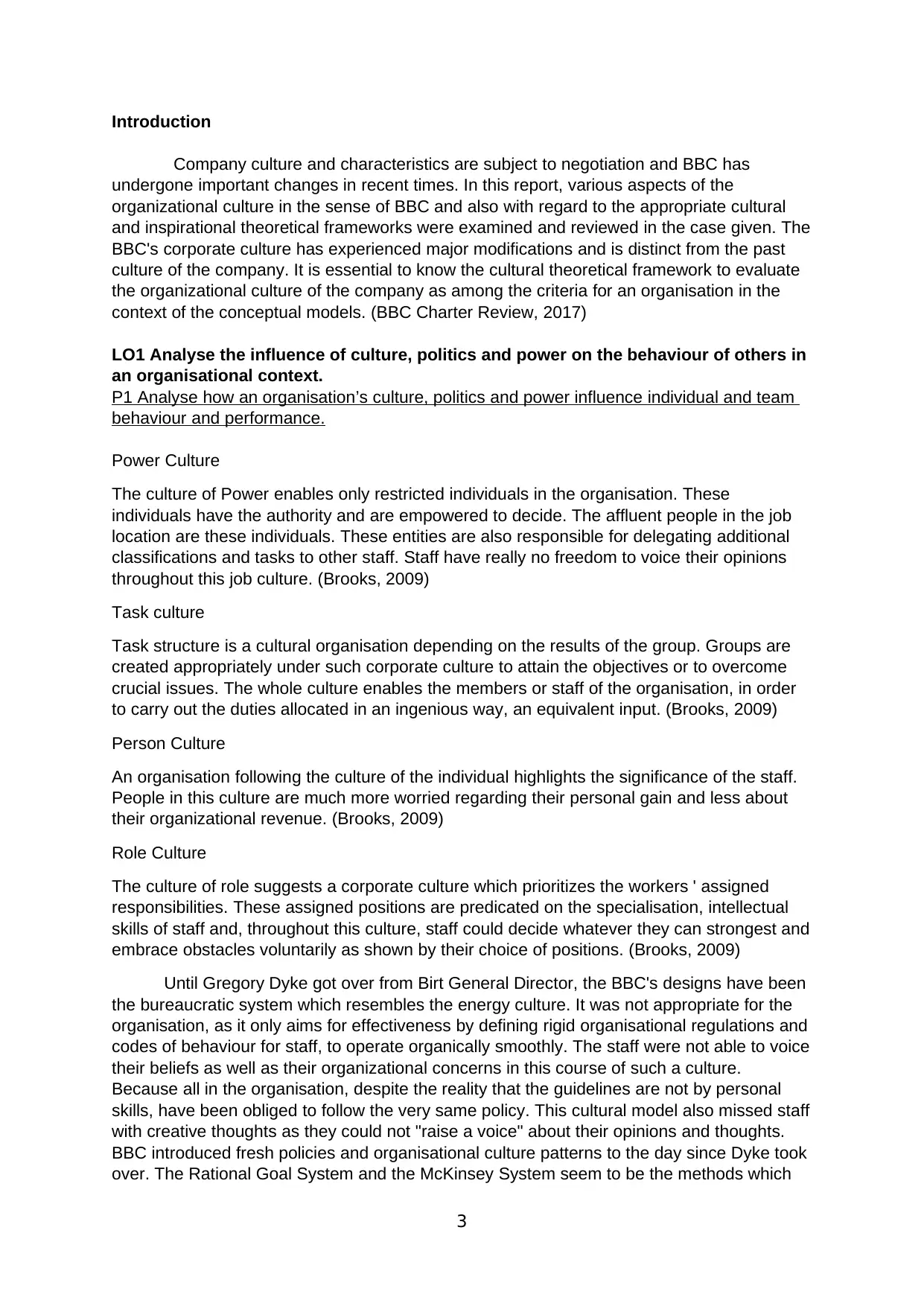
Introduction
Company culture and characteristics are subject to negotiation and BBC has
undergone important changes in recent times. In this report, various aspects of the
organizational culture in the sense of BBC and also with regard to the appropriate cultural
and inspirational theoretical frameworks were examined and reviewed in the case given. The
BBC's corporate culture has experienced major modifications and is distinct from the past
culture of the company. It is essential to know the cultural theoretical framework to evaluate
the organizational culture of the company as among the criteria for an organisation in the
context of the conceptual models. (BBC Charter Review, 2017)
LO1 Analyse the influence of culture, politics and power on the behaviour of others in
an organisational context.
P1 Analyse how an organisation’s culture, politics and power influence individual and team
behaviour and performance.
Power Culture
The culture of Power enables only restricted individuals in the organisation. These
individuals have the authority and are empowered to decide. The affluent people in the job
location are these individuals. These entities are also responsible for delegating additional
classifications and tasks to other staff. Staff have really no freedom to voice their opinions
throughout this job culture. (Brooks, 2009)
Task culture
Task structure is a cultural organisation depending on the results of the group. Groups are
created appropriately under such corporate culture to attain the objectives or to overcome
crucial issues. The whole culture enables the members or staff of the organisation, in order
to carry out the duties allocated in an ingenious way, an equivalent input. (Brooks, 2009)
Person Culture
An organisation following the culture of the individual highlights the significance of the staff.
People in this culture are much more worried regarding their personal gain and less about
their organizational revenue. (Brooks, 2009)
Role Culture
The culture of role suggests a corporate culture which prioritizes the workers ' assigned
responsibilities. These assigned positions are predicated on the specialisation, intellectual
skills of staff and, throughout this culture, staff could decide whatever they can strongest and
embrace obstacles voluntarily as shown by their choice of positions. (Brooks, 2009)
Until Gregory Dyke got over from Birt General Director, the BBC's designs have been
the bureaucratic system which resembles the energy culture. It was not appropriate for the
organisation, as it only aims for effectiveness by defining rigid organisational regulations and
codes of behaviour for staff, to operate organically smoothly. The staff were not able to voice
their beliefs as well as their organizational concerns in this course of such a culture.
Because all in the organisation, despite the reality that the guidelines are not by personal
skills, have been obliged to follow the very same policy. This cultural model also missed staff
with creative thoughts as they could not "raise a voice" about their opinions and thoughts.
BBC introduced fresh policies and organisational culture patterns to the day since Dyke took
over. The Rational Goal System and the McKinsey System seem to be the methods which
3
Company culture and characteristics are subject to negotiation and BBC has
undergone important changes in recent times. In this report, various aspects of the
organizational culture in the sense of BBC and also with regard to the appropriate cultural
and inspirational theoretical frameworks were examined and reviewed in the case given. The
BBC's corporate culture has experienced major modifications and is distinct from the past
culture of the company. It is essential to know the cultural theoretical framework to evaluate
the organizational culture of the company as among the criteria for an organisation in the
context of the conceptual models. (BBC Charter Review, 2017)
LO1 Analyse the influence of culture, politics and power on the behaviour of others in
an organisational context.
P1 Analyse how an organisation’s culture, politics and power influence individual and team
behaviour and performance.
Power Culture
The culture of Power enables only restricted individuals in the organisation. These
individuals have the authority and are empowered to decide. The affluent people in the job
location are these individuals. These entities are also responsible for delegating additional
classifications and tasks to other staff. Staff have really no freedom to voice their opinions
throughout this job culture. (Brooks, 2009)
Task culture
Task structure is a cultural organisation depending on the results of the group. Groups are
created appropriately under such corporate culture to attain the objectives or to overcome
crucial issues. The whole culture enables the members or staff of the organisation, in order
to carry out the duties allocated in an ingenious way, an equivalent input. (Brooks, 2009)
Person Culture
An organisation following the culture of the individual highlights the significance of the staff.
People in this culture are much more worried regarding their personal gain and less about
their organizational revenue. (Brooks, 2009)
Role Culture
The culture of role suggests a corporate culture which prioritizes the workers ' assigned
responsibilities. These assigned positions are predicated on the specialisation, intellectual
skills of staff and, throughout this culture, staff could decide whatever they can strongest and
embrace obstacles voluntarily as shown by their choice of positions. (Brooks, 2009)
Until Gregory Dyke got over from Birt General Director, the BBC's designs have been
the bureaucratic system which resembles the energy culture. It was not appropriate for the
organisation, as it only aims for effectiveness by defining rigid organisational regulations and
codes of behaviour for staff, to operate organically smoothly. The staff were not able to voice
their beliefs as well as their organizational concerns in this course of such a culture.
Because all in the organisation, despite the reality that the guidelines are not by personal
skills, have been obliged to follow the very same policy. This cultural model also missed staff
with creative thoughts as they could not "raise a voice" about their opinions and thoughts.
BBC introduced fresh policies and organisational culture patterns to the day since Dyke took
over. The Rational Goal System and the McKinsey System seem to be the methods which
3
⊘ This is a preview!⊘
Do you want full access?
Subscribe today to unlock all pages.

Trusted by 1+ million students worldwide
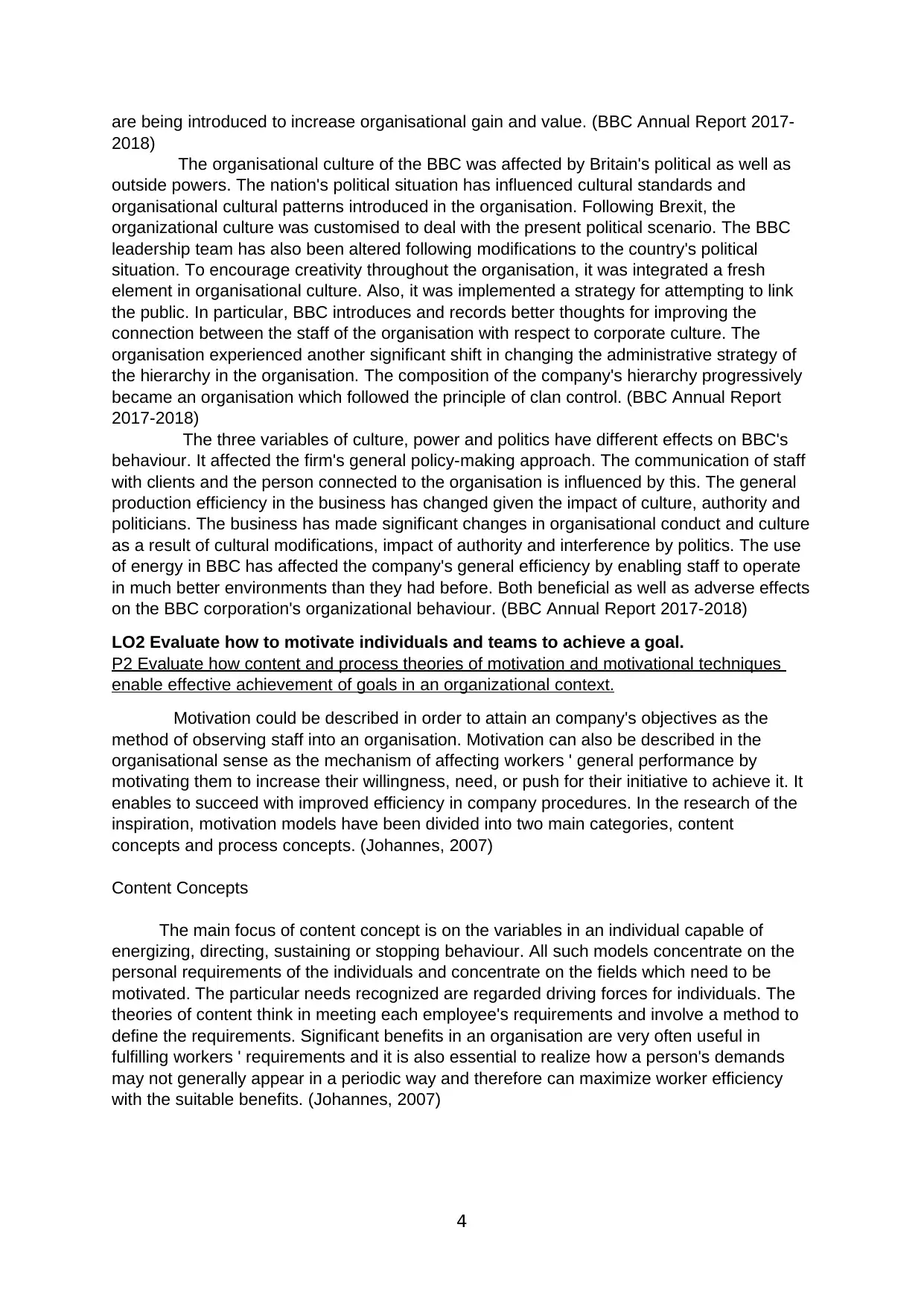
are being introduced to increase organisational gain and value. (BBC Annual Report 2017-
2018)
The organisational culture of the BBC was affected by Britain's political as well as
outside powers. The nation's political situation has influenced cultural standards and
organisational cultural patterns introduced in the organisation. Following Brexit, the
organizational culture was customised to deal with the present political scenario. The BBC
leadership team has also been altered following modifications to the country's political
situation. To encourage creativity throughout the organisation, it was integrated a fresh
element in organisational culture. Also, it was implemented a strategy for attempting to link
the public. In particular, BBC introduces and records better thoughts for improving the
connection between the staff of the organisation with respect to corporate culture. The
organisation experienced another significant shift in changing the administrative strategy of
the hierarchy in the organisation. The composition of the company's hierarchy progressively
became an organisation which followed the principle of clan control. (BBC Annual Report
2017-2018)
The three variables of culture, power and politics have different effects on BBC's
behaviour. It affected the firm's general policy-making approach. The communication of staff
with clients and the person connected to the organisation is influenced by this. The general
production efficiency in the business has changed given the impact of culture, authority and
politicians. The business has made significant changes in organisational conduct and culture
as a result of cultural modifications, impact of authority and interference by politics. The use
of energy in BBC has affected the company's general efficiency by enabling staff to operate
in much better environments than they had before. Both beneficial as well as adverse effects
on the BBC corporation's organizational behaviour. (BBC Annual Report 2017-2018)
LO2 Evaluate how to motivate individuals and teams to achieve a goal.
P2 Evaluate how content and process theories of motivation and motivational techniques
enable effective achievement of goals in an organizational context.
Motivation could be described in order to attain an company's objectives as the
method of observing staff into an organisation. Motivation can also be described in the
organisational sense as the mechanism of affecting workers ' general performance by
motivating them to increase their willingness, need, or push for their initiative to achieve it. It
enables to succeed with improved efficiency in company procedures. In the research of the
inspiration, motivation models have been divided into two main categories, content
concepts and process concepts. (Johannes, 2007)
Content Concepts
The main focus of content concept is on the variables in an individual capable of
energizing, directing, sustaining or stopping behaviour. All such models concentrate on the
personal requirements of the individuals and concentrate on the fields which need to be
motivated. The particular needs recognized are regarded driving forces for individuals. The
theories of content think in meeting each employee's requirements and involve a method to
define the requirements. Significant benefits in an organisation are very often useful in
fulfilling workers ' requirements and it is also essential to realize how a person's demands
may not generally appear in a periodic way and therefore can maximize worker efficiency
with the suitable benefits. (Johannes, 2007)
4
2018)
The organisational culture of the BBC was affected by Britain's political as well as
outside powers. The nation's political situation has influenced cultural standards and
organisational cultural patterns introduced in the organisation. Following Brexit, the
organizational culture was customised to deal with the present political scenario. The BBC
leadership team has also been altered following modifications to the country's political
situation. To encourage creativity throughout the organisation, it was integrated a fresh
element in organisational culture. Also, it was implemented a strategy for attempting to link
the public. In particular, BBC introduces and records better thoughts for improving the
connection between the staff of the organisation with respect to corporate culture. The
organisation experienced another significant shift in changing the administrative strategy of
the hierarchy in the organisation. The composition of the company's hierarchy progressively
became an organisation which followed the principle of clan control. (BBC Annual Report
2017-2018)
The three variables of culture, power and politics have different effects on BBC's
behaviour. It affected the firm's general policy-making approach. The communication of staff
with clients and the person connected to the organisation is influenced by this. The general
production efficiency in the business has changed given the impact of culture, authority and
politicians. The business has made significant changes in organisational conduct and culture
as a result of cultural modifications, impact of authority and interference by politics. The use
of energy in BBC has affected the company's general efficiency by enabling staff to operate
in much better environments than they had before. Both beneficial as well as adverse effects
on the BBC corporation's organizational behaviour. (BBC Annual Report 2017-2018)
LO2 Evaluate how to motivate individuals and teams to achieve a goal.
P2 Evaluate how content and process theories of motivation and motivational techniques
enable effective achievement of goals in an organizational context.
Motivation could be described in order to attain an company's objectives as the
method of observing staff into an organisation. Motivation can also be described in the
organisational sense as the mechanism of affecting workers ' general performance by
motivating them to increase their willingness, need, or push for their initiative to achieve it. It
enables to succeed with improved efficiency in company procedures. In the research of the
inspiration, motivation models have been divided into two main categories, content
concepts and process concepts. (Johannes, 2007)
Content Concepts
The main focus of content concept is on the variables in an individual capable of
energizing, directing, sustaining or stopping behaviour. All such models concentrate on the
personal requirements of the individuals and concentrate on the fields which need to be
motivated. The particular needs recognized are regarded driving forces for individuals. The
theories of content think in meeting each employee's requirements and involve a method to
define the requirements. Significant benefits in an organisation are very often useful in
fulfilling workers ' requirements and it is also essential to realize how a person's demands
may not generally appear in a periodic way and therefore can maximize worker efficiency
with the suitable benefits. (Johannes, 2007)
4
Paraphrase This Document
Need a fresh take? Get an instant paraphrase of this document with our AI Paraphraser
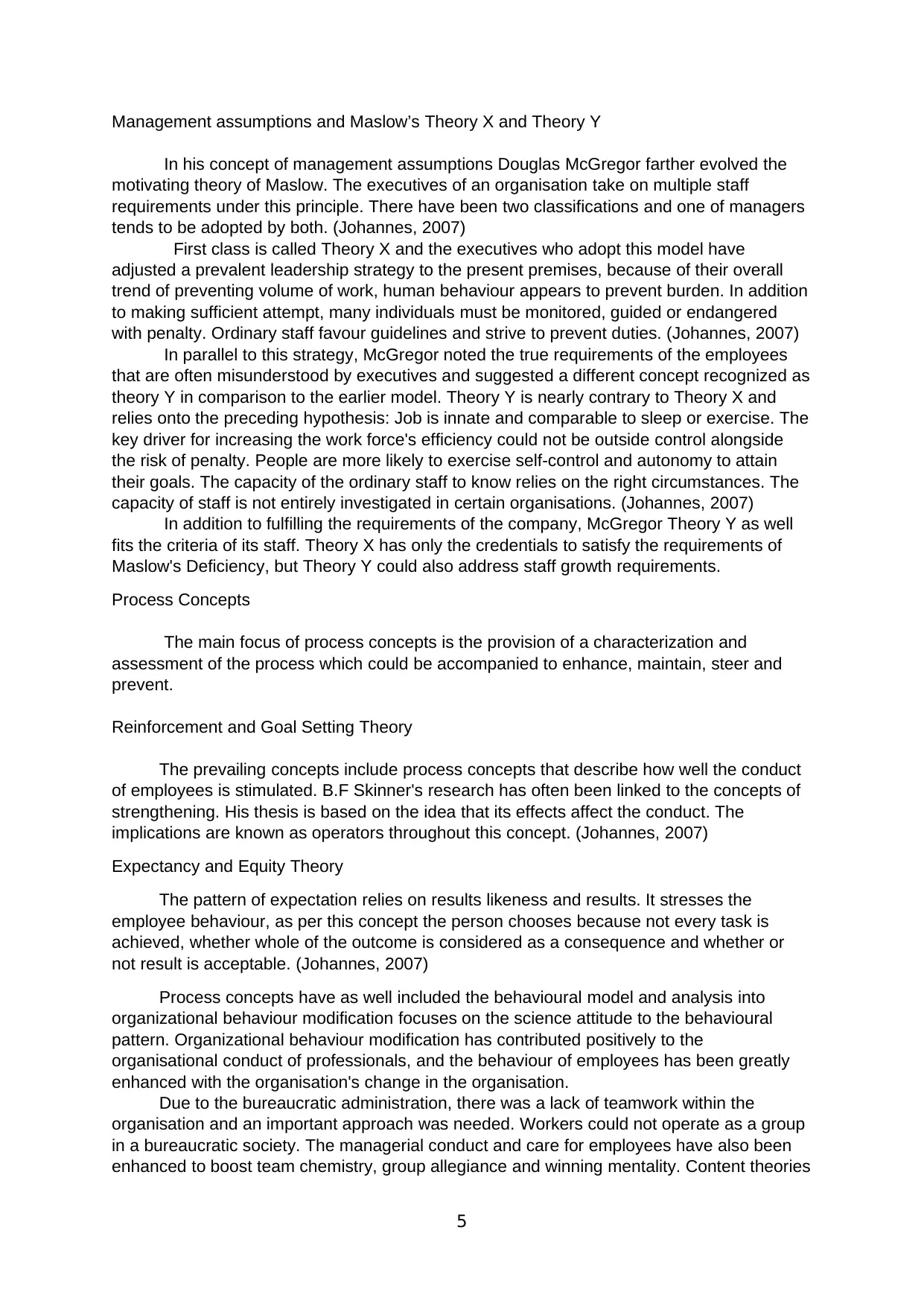
Management assumptions and Maslow’s Theory X and Theory Y
In his concept of management assumptions Douglas McGregor farther evolved the
motivating theory of Maslow. The executives of an organisation take on multiple staff
requirements under this principle. There have been two classifications and one of managers
tends to be adopted by both. (Johannes, 2007)
First class is called Theory X and the executives who adopt this model have
adjusted a prevalent leadership strategy to the present premises, because of their overall
trend of preventing volume of work, human behaviour appears to prevent burden. In addition
to making sufficient attempt, many individuals must be monitored, guided or endangered
with penalty. Ordinary staff favour guidelines and strive to prevent duties. (Johannes, 2007)
In parallel to this strategy, McGregor noted the true requirements of the employees
that are often misunderstood by executives and suggested a different concept recognized as
theory Y in comparison to the earlier model. Theory Y is nearly contrary to Theory X and
relies onto the preceding hypothesis: Job is innate and comparable to sleep or exercise. The
key driver for increasing the work force's efficiency could not be outside control alongside
the risk of penalty. People are more likely to exercise self-control and autonomy to attain
their goals. The capacity of the ordinary staff to know relies on the right circumstances. The
capacity of staff is not entirely investigated in certain organisations. (Johannes, 2007)
In addition to fulfilling the requirements of the company, McGregor Theory Y as well
fits the criteria of its staff. Theory X has only the credentials to satisfy the requirements of
Maslow's Deficiency, but Theory Y could also address staff growth requirements.
Process Concepts
The main focus of process concepts is the provision of a characterization and
assessment of the process which could be accompanied to enhance, maintain, steer and
prevent.
Reinforcement and Goal Setting Theory
The prevailing concepts include process concepts that describe how well the conduct
of employees is stimulated. B.F Skinner's research has often been linked to the concepts of
strengthening. His thesis is based on the idea that its effects affect the conduct. The
implications are known as operators throughout this concept. (Johannes, 2007)
Expectancy and Equity Theory
The pattern of expectation relies on results likeness and results. It stresses the
employee behaviour, as per this concept the person chooses because not every task is
achieved, whether whole of the outcome is considered as a consequence and whether or
not result is acceptable. (Johannes, 2007)
Process concepts have as well included the behavioural model and analysis into
organizational behaviour modification focuses on the science attitude to the behavioural
pattern. Organizational behaviour modification has contributed positively to the
organisational conduct of professionals, and the behaviour of employees has been greatly
enhanced with the organisation's change in the organisation.
Due to the bureaucratic administration, there was a lack of teamwork within the
organisation and an important approach was needed. Workers could not operate as a group
in a bureaucratic society. The managerial conduct and care for employees have also been
enhanced to boost team chemistry, group allegiance and winning mentality. Content theories
5
In his concept of management assumptions Douglas McGregor farther evolved the
motivating theory of Maslow. The executives of an organisation take on multiple staff
requirements under this principle. There have been two classifications and one of managers
tends to be adopted by both. (Johannes, 2007)
First class is called Theory X and the executives who adopt this model have
adjusted a prevalent leadership strategy to the present premises, because of their overall
trend of preventing volume of work, human behaviour appears to prevent burden. In addition
to making sufficient attempt, many individuals must be monitored, guided or endangered
with penalty. Ordinary staff favour guidelines and strive to prevent duties. (Johannes, 2007)
In parallel to this strategy, McGregor noted the true requirements of the employees
that are often misunderstood by executives and suggested a different concept recognized as
theory Y in comparison to the earlier model. Theory Y is nearly contrary to Theory X and
relies onto the preceding hypothesis: Job is innate and comparable to sleep or exercise. The
key driver for increasing the work force's efficiency could not be outside control alongside
the risk of penalty. People are more likely to exercise self-control and autonomy to attain
their goals. The capacity of the ordinary staff to know relies on the right circumstances. The
capacity of staff is not entirely investigated in certain organisations. (Johannes, 2007)
In addition to fulfilling the requirements of the company, McGregor Theory Y as well
fits the criteria of its staff. Theory X has only the credentials to satisfy the requirements of
Maslow's Deficiency, but Theory Y could also address staff growth requirements.
Process Concepts
The main focus of process concepts is the provision of a characterization and
assessment of the process which could be accompanied to enhance, maintain, steer and
prevent.
Reinforcement and Goal Setting Theory
The prevailing concepts include process concepts that describe how well the conduct
of employees is stimulated. B.F Skinner's research has often been linked to the concepts of
strengthening. His thesis is based on the idea that its effects affect the conduct. The
implications are known as operators throughout this concept. (Johannes, 2007)
Expectancy and Equity Theory
The pattern of expectation relies on results likeness and results. It stresses the
employee behaviour, as per this concept the person chooses because not every task is
achieved, whether whole of the outcome is considered as a consequence and whether or
not result is acceptable. (Johannes, 2007)
Process concepts have as well included the behavioural model and analysis into
organizational behaviour modification focuses on the science attitude to the behavioural
pattern. Organizational behaviour modification has contributed positively to the
organisational conduct of professionals, and the behaviour of employees has been greatly
enhanced with the organisation's change in the organisation.
Due to the bureaucratic administration, there was a lack of teamwork within the
organisation and an important approach was needed. Workers could not operate as a group
in a bureaucratic society. The managerial conduct and care for employees have also been
enhanced to boost team chemistry, group allegiance and winning mentality. Content theories
5
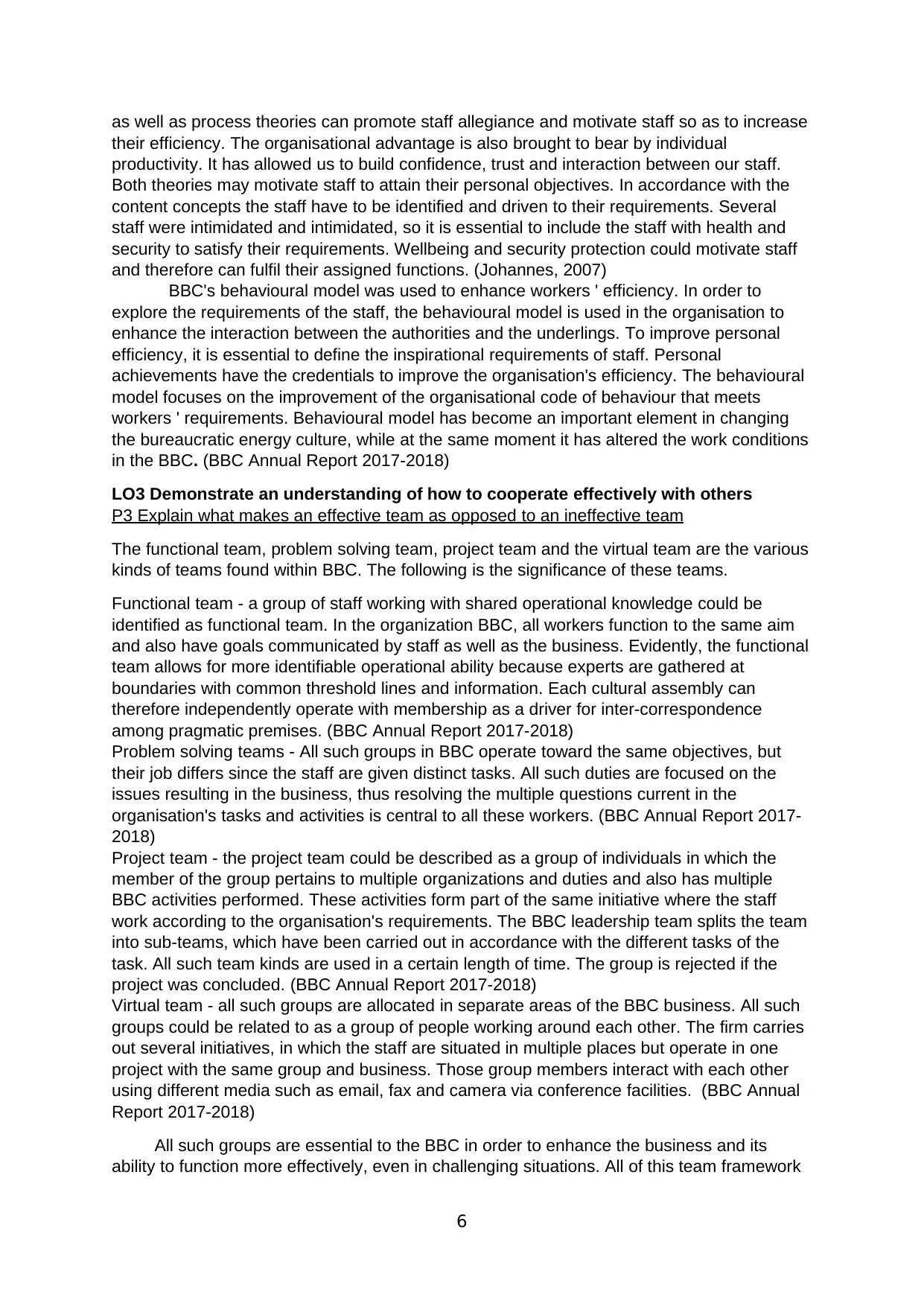
as well as process theories can promote staff allegiance and motivate staff so as to increase
their efficiency. The organisational advantage is also brought to bear by individual
productivity. It has allowed us to build confidence, trust and interaction between our staff.
Both theories may motivate staff to attain their personal objectives. In accordance with the
content concepts the staff have to be identified and driven to their requirements. Several
staff were intimidated and intimidated, so it is essential to include the staff with health and
security to satisfy their requirements. Wellbeing and security protection could motivate staff
and therefore can fulfil their assigned functions. (Johannes, 2007)
BBC's behavioural model was used to enhance workers ' efficiency. In order to
explore the requirements of the staff, the behavioural model is used in the organisation to
enhance the interaction between the authorities and the underlings. To improve personal
efficiency, it is essential to define the inspirational requirements of staff. Personal
achievements have the credentials to improve the organisation's efficiency. The behavioural
model focuses on the improvement of the organisational code of behaviour that meets
workers ' requirements. Behavioural model has become an important element in changing
the bureaucratic energy culture, while at the same moment it has altered the work conditions
in the BBC. (BBC Annual Report 2017-2018)
LO3 Demonstrate an understanding of how to cooperate effectively with others
P3 Explain what makes an effective team as opposed to an ineffective team
The functional team, problem solving team, project team and the virtual team are the various
kinds of teams found within BBC. The following is the significance of these teams.
Functional team - a group of staff working with shared operational knowledge could be
identified as functional team. In the organization BBC, all workers function to the same aim
and also have goals communicated by staff as well as the business. Evidently, the functional
team allows for more identifiable operational ability because experts are gathered at
boundaries with common threshold lines and information. Each cultural assembly can
therefore independently operate with membership as a driver for inter-correspondence
among pragmatic premises. (BBC Annual Report 2017-2018)
Problem solving teams - All such groups in BBC operate toward the same objectives, but
their job differs since the staff are given distinct tasks. All such duties are focused on the
issues resulting in the business, thus resolving the multiple questions current in the
organisation's tasks and activities is central to all these workers. (BBC Annual Report 2017-
2018)
Project team - the project team could be described as a group of individuals in which the
member of the group pertains to multiple organizations and duties and also has multiple
BBC activities performed. These activities form part of the same initiative where the staff
work according to the organisation's requirements. The BBC leadership team splits the team
into sub-teams, which have been carried out in accordance with the different tasks of the
task. All such team kinds are used in a certain length of time. The group is rejected if the
project was concluded. (BBC Annual Report 2017-2018)
Virtual team - all such groups are allocated in separate areas of the BBC business. All such
groups could be related to as a group of people working around each other. The firm carries
out several initiatives, in which the staff are situated in multiple places but operate in one
project with the same group and business. Those group members interact with each other
using different media such as email, fax and camera via conference facilities. (BBC Annual
Report 2017-2018)
All such groups are essential to the BBC in order to enhance the business and its
ability to function more effectively, even in challenging situations. All of this team framework
6
their efficiency. The organisational advantage is also brought to bear by individual
productivity. It has allowed us to build confidence, trust and interaction between our staff.
Both theories may motivate staff to attain their personal objectives. In accordance with the
content concepts the staff have to be identified and driven to their requirements. Several
staff were intimidated and intimidated, so it is essential to include the staff with health and
security to satisfy their requirements. Wellbeing and security protection could motivate staff
and therefore can fulfil their assigned functions. (Johannes, 2007)
BBC's behavioural model was used to enhance workers ' efficiency. In order to
explore the requirements of the staff, the behavioural model is used in the organisation to
enhance the interaction between the authorities and the underlings. To improve personal
efficiency, it is essential to define the inspirational requirements of staff. Personal
achievements have the credentials to improve the organisation's efficiency. The behavioural
model focuses on the improvement of the organisational code of behaviour that meets
workers ' requirements. Behavioural model has become an important element in changing
the bureaucratic energy culture, while at the same moment it has altered the work conditions
in the BBC. (BBC Annual Report 2017-2018)
LO3 Demonstrate an understanding of how to cooperate effectively with others
P3 Explain what makes an effective team as opposed to an ineffective team
The functional team, problem solving team, project team and the virtual team are the various
kinds of teams found within BBC. The following is the significance of these teams.
Functional team - a group of staff working with shared operational knowledge could be
identified as functional team. In the organization BBC, all workers function to the same aim
and also have goals communicated by staff as well as the business. Evidently, the functional
team allows for more identifiable operational ability because experts are gathered at
boundaries with common threshold lines and information. Each cultural assembly can
therefore independently operate with membership as a driver for inter-correspondence
among pragmatic premises. (BBC Annual Report 2017-2018)
Problem solving teams - All such groups in BBC operate toward the same objectives, but
their job differs since the staff are given distinct tasks. All such duties are focused on the
issues resulting in the business, thus resolving the multiple questions current in the
organisation's tasks and activities is central to all these workers. (BBC Annual Report 2017-
2018)
Project team - the project team could be described as a group of individuals in which the
member of the group pertains to multiple organizations and duties and also has multiple
BBC activities performed. These activities form part of the same initiative where the staff
work according to the organisation's requirements. The BBC leadership team splits the team
into sub-teams, which have been carried out in accordance with the different tasks of the
task. All such team kinds are used in a certain length of time. The group is rejected if the
project was concluded. (BBC Annual Report 2017-2018)
Virtual team - all such groups are allocated in separate areas of the BBC business. All such
groups could be related to as a group of people working around each other. The firm carries
out several initiatives, in which the staff are situated in multiple places but operate in one
project with the same group and business. Those group members interact with each other
using different media such as email, fax and camera via conference facilities. (BBC Annual
Report 2017-2018)
All such groups are essential to the BBC in order to enhance the business and its
ability to function more effectively, even in challenging situations. All of this team framework
6
⊘ This is a preview!⊘
Do you want full access?
Subscribe today to unlock all pages.

Trusted by 1+ million students worldwide
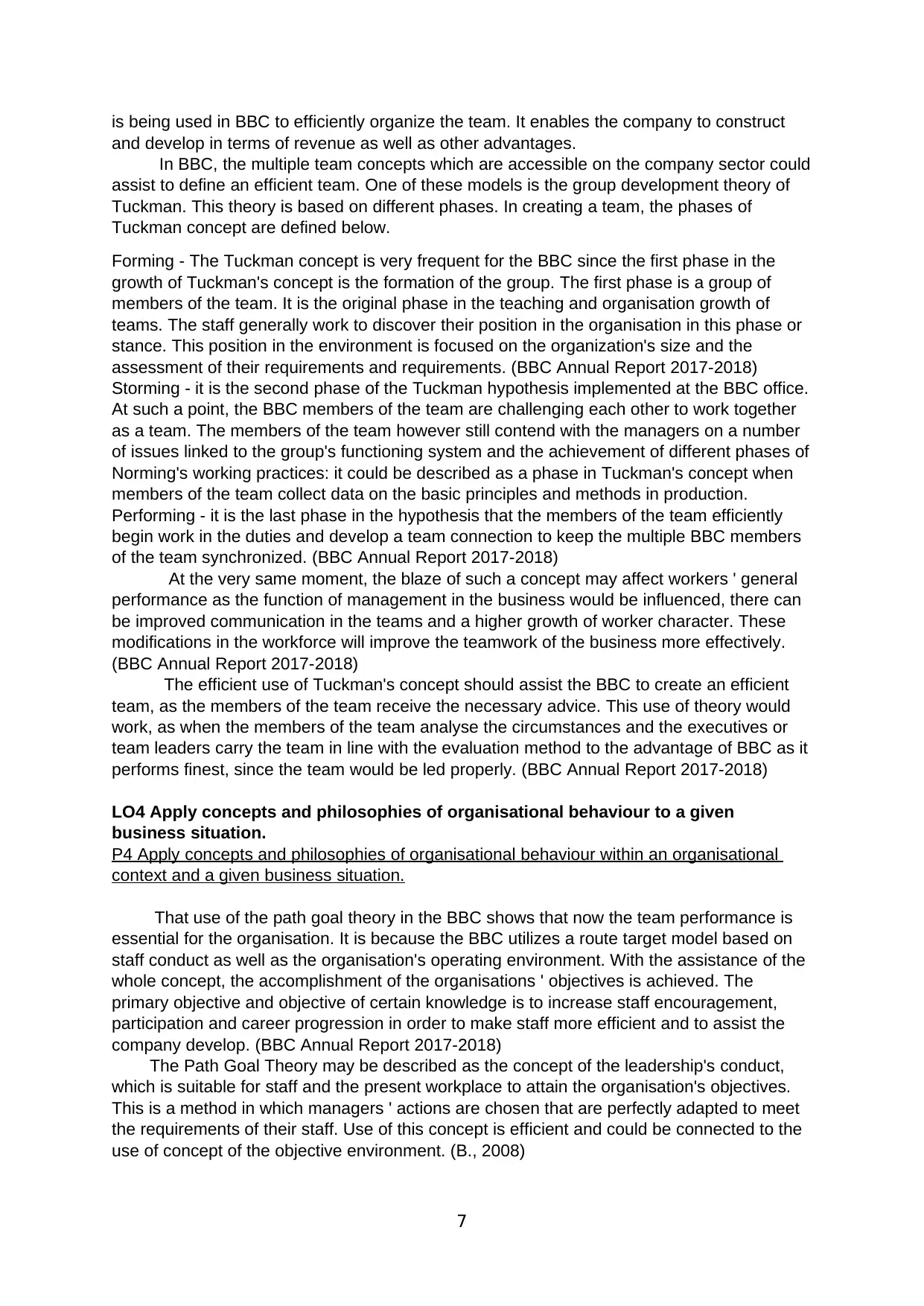
is being used in BBC to efficiently organize the team. It enables the company to construct
and develop in terms of revenue as well as other advantages.
In BBC, the multiple team concepts which are accessible on the company sector could
assist to define an efficient team. One of these models is the group development theory of
Tuckman. This theory is based on different phases. In creating a team, the phases of
Tuckman concept are defined below.
Forming - The Tuckman concept is very frequent for the BBC since the first phase in the
growth of Tuckman's concept is the formation of the group. The first phase is a group of
members of the team. It is the original phase in the teaching and organisation growth of
teams. The staff generally work to discover their position in the organisation in this phase or
stance. This position in the environment is focused on the organization's size and the
assessment of their requirements and requirements. (BBC Annual Report 2017-2018)
Storming - it is the second phase of the Tuckman hypothesis implemented at the BBC office.
At such a point, the BBC members of the team are challenging each other to work together
as a team. The members of the team however still contend with the managers on a number
of issues linked to the group's functioning system and the achievement of different phases of
Norming's working practices: it could be described as a phase in Tuckman's concept when
members of the team collect data on the basic principles and methods in production.
Performing - it is the last phase in the hypothesis that the members of the team efficiently
begin work in the duties and develop a team connection to keep the multiple BBC members
of the team synchronized. (BBC Annual Report 2017-2018)
At the very same moment, the blaze of such a concept may affect workers ' general
performance as the function of management in the business would be influenced, there can
be improved communication in the teams and a higher growth of worker character. These
modifications in the workforce will improve the teamwork of the business more effectively.
(BBC Annual Report 2017-2018)
The efficient use of Tuckman's concept should assist the BBC to create an efficient
team, as the members of the team receive the necessary advice. This use of theory would
work, as when the members of the team analyse the circumstances and the executives or
team leaders carry the team in line with the evaluation method to the advantage of BBC as it
performs finest, since the team would be led properly. (BBC Annual Report 2017-2018)
LO4 Apply concepts and philosophies of organisational behaviour to a given
business situation.
P4 Apply concepts and philosophies of organisational behaviour within an organisational
context and a given business situation.
That use of the path goal theory in the BBC shows that now the team performance is
essential for the organisation. It is because the BBC utilizes a route target model based on
staff conduct as well as the organisation's operating environment. With the assistance of the
whole concept, the accomplishment of the organisations ' objectives is achieved. The
primary objective and objective of certain knowledge is to increase staff encouragement,
participation and career progression in order to make staff more efficient and to assist the
company develop. (BBC Annual Report 2017-2018)
The Path Goal Theory may be described as the concept of the leadership's conduct,
which is suitable for staff and the present workplace to attain the organisation's objectives.
This is a method in which managers ' actions are chosen that are perfectly adapted to meet
the requirements of their staff. Use of this concept is efficient and could be connected to the
use of concept of the objective environment. (B., 2008)
7
and develop in terms of revenue as well as other advantages.
In BBC, the multiple team concepts which are accessible on the company sector could
assist to define an efficient team. One of these models is the group development theory of
Tuckman. This theory is based on different phases. In creating a team, the phases of
Tuckman concept are defined below.
Forming - The Tuckman concept is very frequent for the BBC since the first phase in the
growth of Tuckman's concept is the formation of the group. The first phase is a group of
members of the team. It is the original phase in the teaching and organisation growth of
teams. The staff generally work to discover their position in the organisation in this phase or
stance. This position in the environment is focused on the organization's size and the
assessment of their requirements and requirements. (BBC Annual Report 2017-2018)
Storming - it is the second phase of the Tuckman hypothesis implemented at the BBC office.
At such a point, the BBC members of the team are challenging each other to work together
as a team. The members of the team however still contend with the managers on a number
of issues linked to the group's functioning system and the achievement of different phases of
Norming's working practices: it could be described as a phase in Tuckman's concept when
members of the team collect data on the basic principles and methods in production.
Performing - it is the last phase in the hypothesis that the members of the team efficiently
begin work in the duties and develop a team connection to keep the multiple BBC members
of the team synchronized. (BBC Annual Report 2017-2018)
At the very same moment, the blaze of such a concept may affect workers ' general
performance as the function of management in the business would be influenced, there can
be improved communication in the teams and a higher growth of worker character. These
modifications in the workforce will improve the teamwork of the business more effectively.
(BBC Annual Report 2017-2018)
The efficient use of Tuckman's concept should assist the BBC to create an efficient
team, as the members of the team receive the necessary advice. This use of theory would
work, as when the members of the team analyse the circumstances and the executives or
team leaders carry the team in line with the evaluation method to the advantage of BBC as it
performs finest, since the team would be led properly. (BBC Annual Report 2017-2018)
LO4 Apply concepts and philosophies of organisational behaviour to a given
business situation.
P4 Apply concepts and philosophies of organisational behaviour within an organisational
context and a given business situation.
That use of the path goal theory in the BBC shows that now the team performance is
essential for the organisation. It is because the BBC utilizes a route target model based on
staff conduct as well as the organisation's operating environment. With the assistance of the
whole concept, the accomplishment of the organisations ' objectives is achieved. The
primary objective and objective of certain knowledge is to increase staff encouragement,
participation and career progression in order to make staff more efficient and to assist the
company develop. (BBC Annual Report 2017-2018)
The Path Goal Theory may be described as the concept of the leadership's conduct,
which is suitable for staff and the present workplace to attain the organisation's objectives.
This is a method in which managers ' actions are chosen that are perfectly adapted to meet
the requirements of their staff. Use of this concept is efficient and could be connected to the
use of concept of the objective environment. (B., 2008)
7
Paraphrase This Document
Need a fresh take? Get an instant paraphrase of this document with our AI Paraphraser
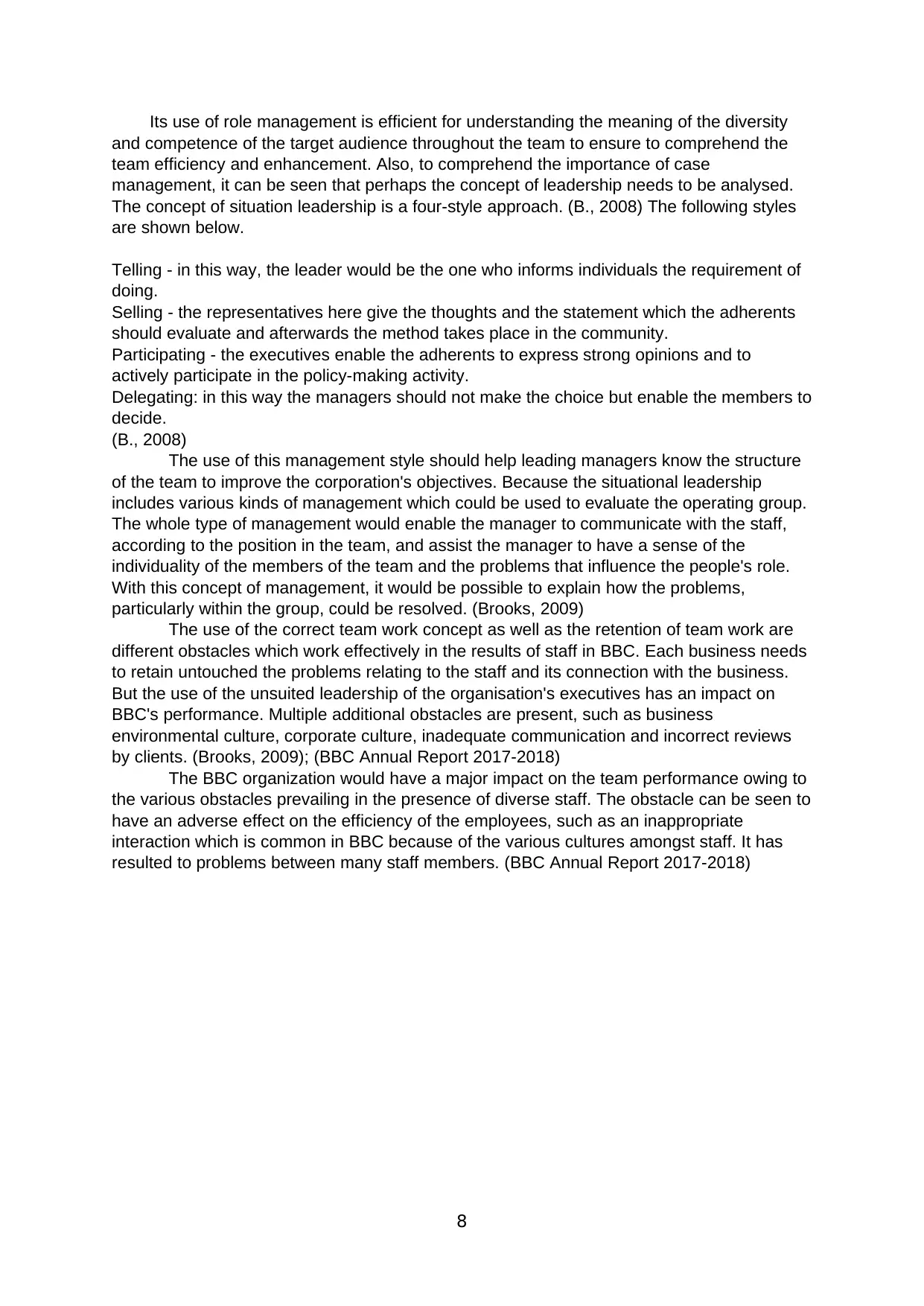
Its use of role management is efficient for understanding the meaning of the diversity
and competence of the target audience throughout the team to ensure to comprehend the
team efficiency and enhancement. Also, to comprehend the importance of case
management, it can be seen that perhaps the concept of leadership needs to be analysed.
The concept of situation leadership is a four-style approach. (B., 2008) The following styles
are shown below.
Telling - in this way, the leader would be the one who informs individuals the requirement of
doing.
Selling - the representatives here give the thoughts and the statement which the adherents
should evaluate and afterwards the method takes place in the community.
Participating - the executives enable the adherents to express strong opinions and to
actively participate in the policy-making activity.
Delegating: in this way the managers should not make the choice but enable the members to
decide.
(B., 2008)
The use of this management style should help leading managers know the structure
of the team to improve the corporation's objectives. Because the situational leadership
includes various kinds of management which could be used to evaluate the operating group.
The whole type of management would enable the manager to communicate with the staff,
according to the position in the team, and assist the manager to have a sense of the
individuality of the members of the team and the problems that influence the people's role.
With this concept of management, it would be possible to explain how the problems,
particularly within the group, could be resolved. (Brooks, 2009)
The use of the correct team work concept as well as the retention of team work are
different obstacles which work effectively in the results of staff in BBC. Each business needs
to retain untouched the problems relating to the staff and its connection with the business.
But the use of the unsuited leadership of the organisation's executives has an impact on
BBC's performance. Multiple additional obstacles are present, such as business
environmental culture, corporate culture, inadequate communication and incorrect reviews
by clients. (Brooks, 2009); (BBC Annual Report 2017-2018)
The BBC organization would have a major impact on the team performance owing to
the various obstacles prevailing in the presence of diverse staff. The obstacle can be seen to
have an adverse effect on the efficiency of the employees, such as an inappropriate
interaction which is common in BBC because of the various cultures amongst staff. It has
resulted to problems between many staff members. (BBC Annual Report 2017-2018)
8
and competence of the target audience throughout the team to ensure to comprehend the
team efficiency and enhancement. Also, to comprehend the importance of case
management, it can be seen that perhaps the concept of leadership needs to be analysed.
The concept of situation leadership is a four-style approach. (B., 2008) The following styles
are shown below.
Telling - in this way, the leader would be the one who informs individuals the requirement of
doing.
Selling - the representatives here give the thoughts and the statement which the adherents
should evaluate and afterwards the method takes place in the community.
Participating - the executives enable the adherents to express strong opinions and to
actively participate in the policy-making activity.
Delegating: in this way the managers should not make the choice but enable the members to
decide.
(B., 2008)
The use of this management style should help leading managers know the structure
of the team to improve the corporation's objectives. Because the situational leadership
includes various kinds of management which could be used to evaluate the operating group.
The whole type of management would enable the manager to communicate with the staff,
according to the position in the team, and assist the manager to have a sense of the
individuality of the members of the team and the problems that influence the people's role.
With this concept of management, it would be possible to explain how the problems,
particularly within the group, could be resolved. (Brooks, 2009)
The use of the correct team work concept as well as the retention of team work are
different obstacles which work effectively in the results of staff in BBC. Each business needs
to retain untouched the problems relating to the staff and its connection with the business.
But the use of the unsuited leadership of the organisation's executives has an impact on
BBC's performance. Multiple additional obstacles are present, such as business
environmental culture, corporate culture, inadequate communication and incorrect reviews
by clients. (Brooks, 2009); (BBC Annual Report 2017-2018)
The BBC organization would have a major impact on the team performance owing to
the various obstacles prevailing in the presence of diverse staff. The obstacle can be seen to
have an adverse effect on the efficiency of the employees, such as an inappropriate
interaction which is common in BBC because of the various cultures amongst staff. It has
resulted to problems between many staff members. (BBC Annual Report 2017-2018)
8
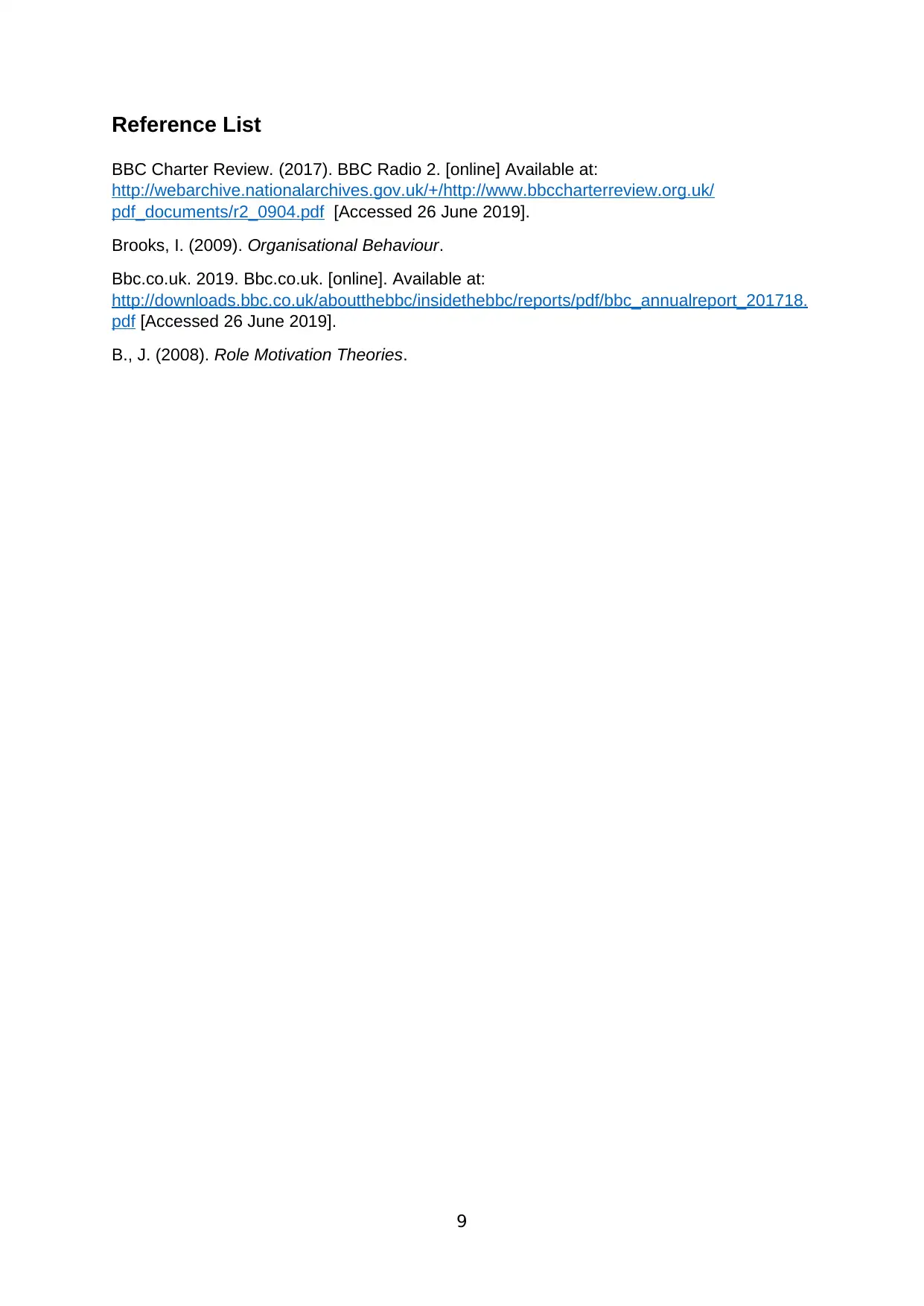
Reference List
BBC Charter Review. (2017). BBC Radio 2. [online] Available at:
http://webarchive.nationalarchives.gov.uk/+/http://www.bbccharterreview.org.uk/
pdf_documents/r2_0904.pdf [Accessed 26 June 2019].
Brooks, I. (2009). Organisational Behaviour.
Bbc.co.uk. 2019. Bbc.co.uk. [online]. Available at:
http://downloads.bbc.co.uk/aboutthebbc/insidethebbc/reports/pdf/bbc_annualreport_201718.
pdf [Accessed 26 June 2019].
B., J. (2008). Role Motivation Theories.
9
BBC Charter Review. (2017). BBC Radio 2. [online] Available at:
http://webarchive.nationalarchives.gov.uk/+/http://www.bbccharterreview.org.uk/
pdf_documents/r2_0904.pdf [Accessed 26 June 2019].
Brooks, I. (2009). Organisational Behaviour.
Bbc.co.uk. 2019. Bbc.co.uk. [online]. Available at:
http://downloads.bbc.co.uk/aboutthebbc/insidethebbc/reports/pdf/bbc_annualreport_201718.
pdf [Accessed 26 June 2019].
B., J. (2008). Role Motivation Theories.
9
⊘ This is a preview!⊘
Do you want full access?
Subscribe today to unlock all pages.

Trusted by 1+ million students worldwide
1 out of 9
Related Documents
Your All-in-One AI-Powered Toolkit for Academic Success.
+13062052269
info@desklib.com
Available 24*7 on WhatsApp / Email
![[object Object]](/_next/static/media/star-bottom.7253800d.svg)
Unlock your academic potential
Copyright © 2020–2026 A2Z Services. All Rights Reserved. Developed and managed by ZUCOL.





